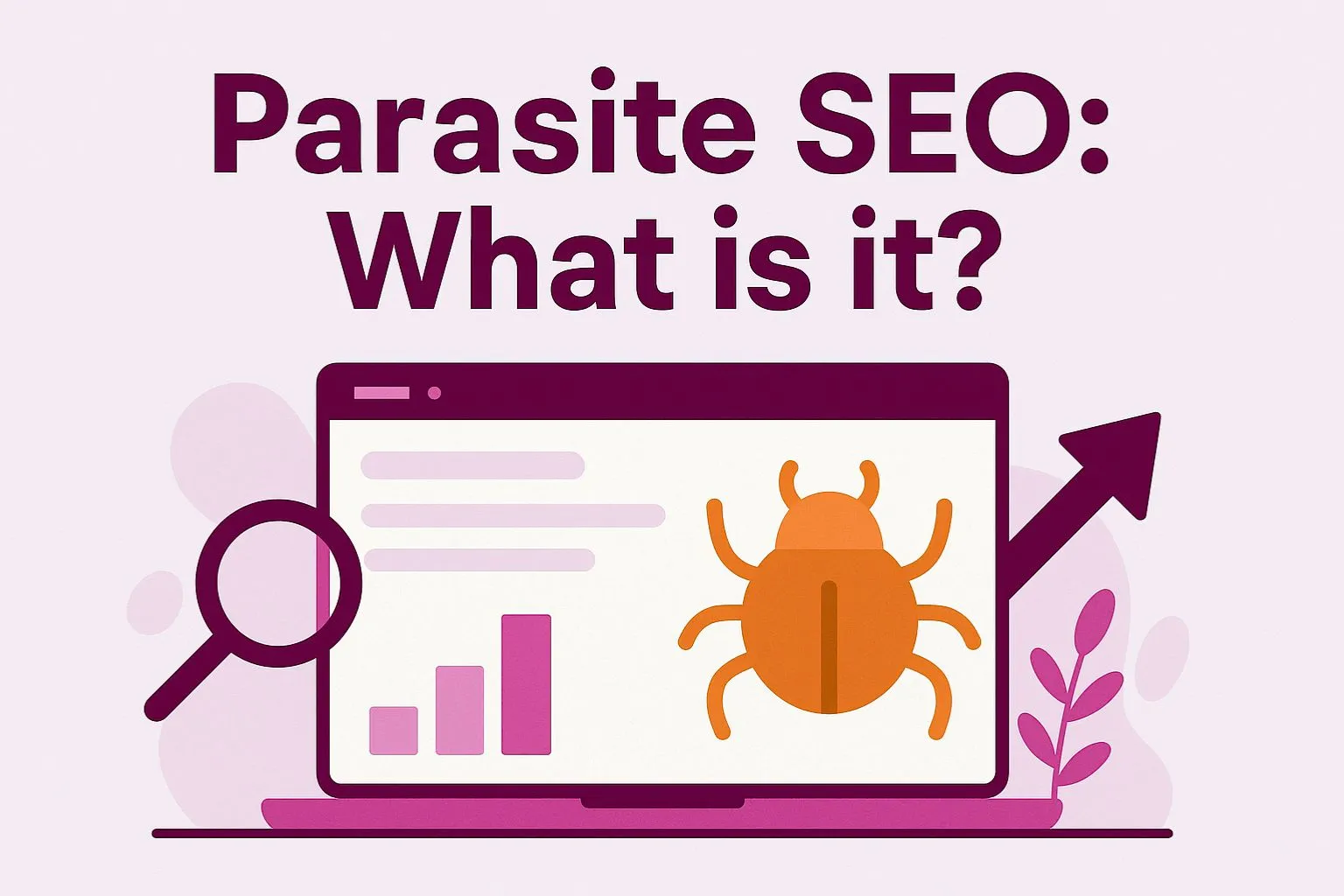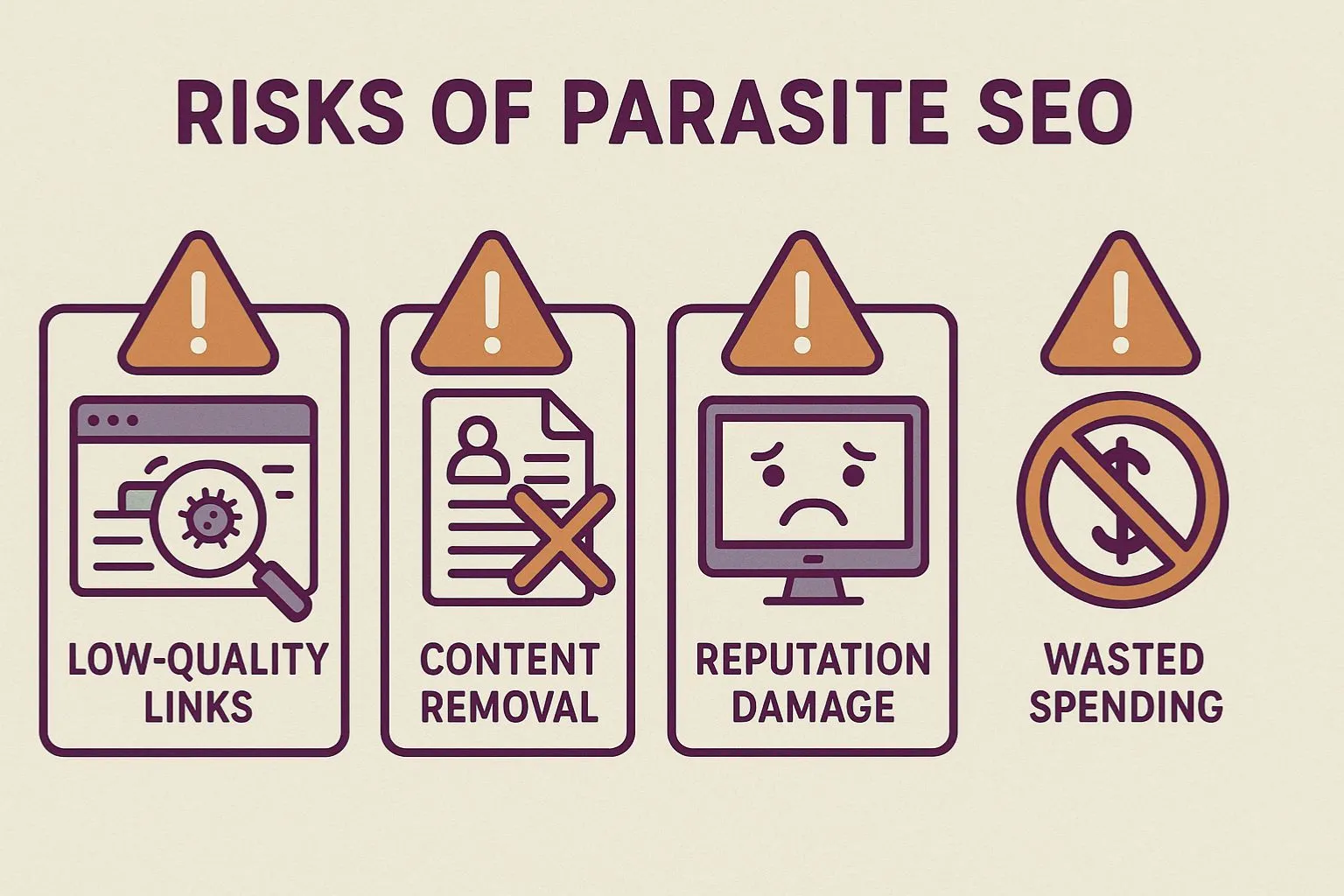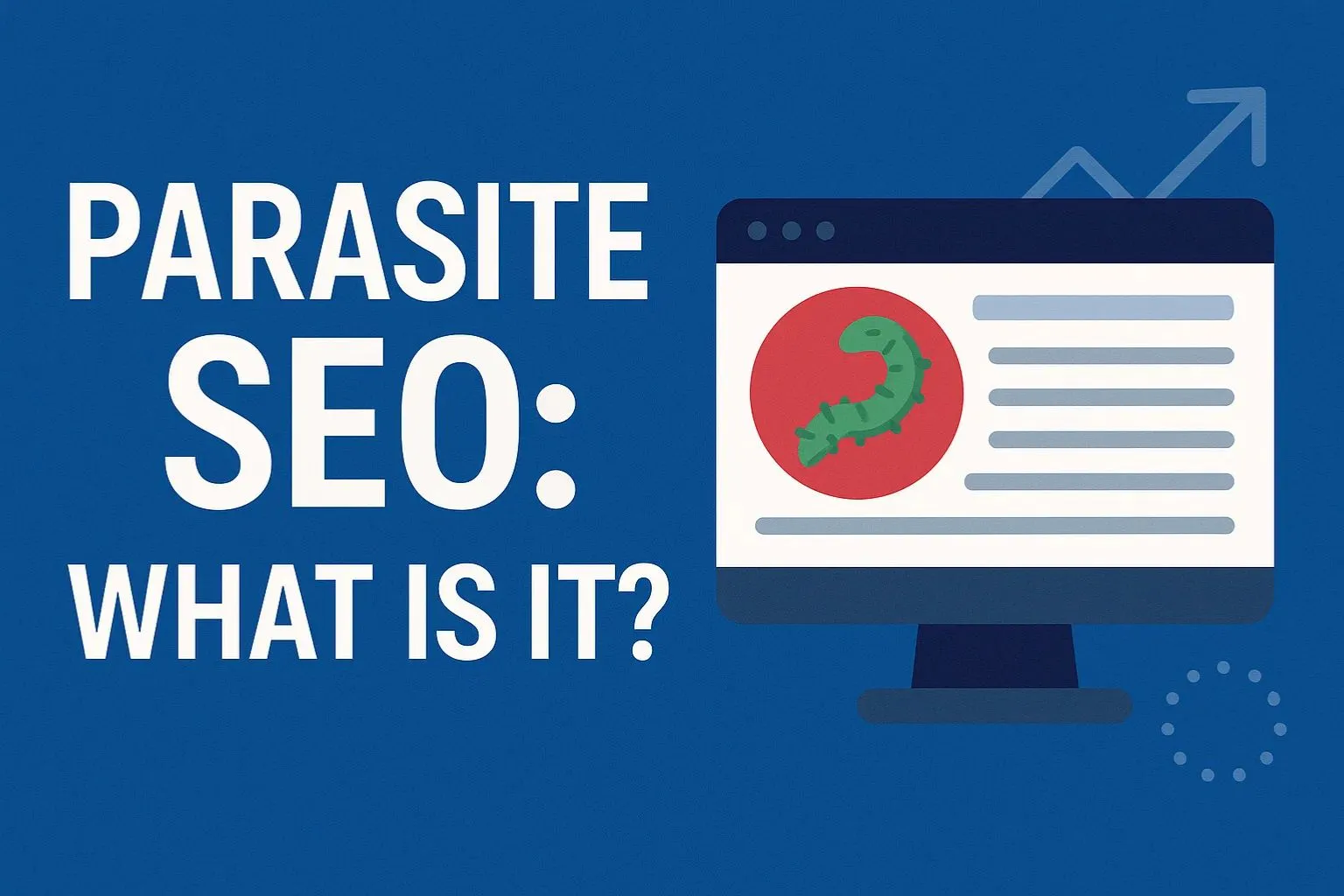A parasite is an individual that lives in a host organism, while taking advantage of its nutrients to grow. What do you think this has to do with SEO? We are not talking about biology, but rather a strategy to enhance the strength of your brand on the web.

Parasite SEO, or parasitic SEO, is an optimization strategy focused on building authority to improve your ranking in competitive keywords. This should be done by publishing valuable content on other sites that rank highly in Google search.
Although it is often seen as a black hat, parasite SEO can be a correct and ethical strategy in the eyes of Google, you just need to follow the correct guidelines. See now how to do it!
What is Parasite SEO?
Parasite SEO is an off-page optimization strategy that consists of publishing content on authoritative sites to take advantage of their visibility and relevance and enhance the strength of your brand. In Portuguese, it can also be called parasite SEO, barnacle SEO, or parasite hosting.
Parasite SEO focuses on highly competitive keywords with a higher search volume. When you publish content on a website well-known by the public and Google, you have a better chance of ranking for those terms in the search engine. Even without backlinks to your website, you gain branding strength, which also counts points for Google.
However, this off-page SEO strategy is often used as a black hat SEO, so it is not always viewed favorably. However, this only happens when websites do not use parasite SEO ethically.
On the other hand, if you align the strategy with Google guidelines, you can achieve results
What is a Black Hat?
Black hat refers to unethical and often illegal practices in the world of technology and digital marketing that are used to obtain advantages or quick results, violating established rules or guidelines.

In the context of SEO, black hat includes, for example, tactics such as keyword overuse, creation of hidden content that the user does not see but the search engine recognizes, and purchasing links to manipulate search rankings.
It is a way of ‘tricking’ the algorithm to gain and climb positions more quickly, but unethically.
These practices may offer short-term gains, but usually result in severe penalties from search engines, such as the removal of the site from search results.
A classic example of a black hat that we are seeing a lot in SERPs these days is the promotion of Telegram groups or betting sites using highly reputable domains, such as federal universities and/or government websites, as shown in the example below:
Example of a “Good” SEO Parasite
A good example of a parasite SEO is the content written by consultant Ryan Stewart, published on the Moz blog, explaining why he had stopped selling SEO services. According to the Ahrefs blog, the page generated thousands of organic visits for the keyword “SEO services”.
At the time of publication in 2015, Moz’s domain had almost twice the authority score of the website of the agency Ryan worked for. This means that if he had chosen to publish on the agency’s website, he would not have achieved as much visibility and recognition as a thought leader on the topic.
Why does Parasite SEO Work?
Parasite SEO works because content can take advantage of the authority of the “host” site to gain greater visibility and relevance.
The site boosts the content in Google’s rankings because it already has privileged positions in the search engine. When the site is a reference in your niche, you also benefit from the authority on the topic that it already has.
You would hardly be able to achieve this with traditional SEO, especially in more competitive keywords, because you have a smaller site with less authority, which the algorithm does not favor.
By partnering with an authoritative site in your niche and gaining better positions in the search, you can strengthen your brand, both for the public and for Google. Even if the content is not published on your site, you benefit from this visibility because the search engine recognizes the authorship of your brand and considers it a reference.
In addition, a site with high authority transmits more link juice through backlinks. In the link-building strategy, it is always important to seek reliable partners, relevant in your niche, who transmit more authority through link juice.
This is also why parasite SEO works: by including backlinks from authoritative sites to your pages, you gain more link juice.
However, not all parasite SEO content carries backlinks because they can look like black hats to Google.
In any case, parasite content strengthens your brand even without links, which gains recognition from the search engine.
Ethical issues of parasite SEO
Parasite SEO can be interpreted as black hat when applied abusively. This practice has become common among websites that want to artificially rise in Google’s ranking for hard-to-rank keywords.
But when can parasite SEO be understood as black hat? When the content is published on a low-quality website, it has no relevance whatsoever to its visiting audience and still insists on backlinks, anchor texts, and keywords in an artificial way.
The purpose of this type of content is only to manipulate Google’s algorithm, without offering value to the user. Google can punish these bad practices because they go against its spam policies.
And when can parasite SEO be considered white hat, that is, “good”? When the content:
- Is published on reliable and quality websites;
- Delivers value to the visiting audience in the same niche of interest.
- Uses links, anchor text, and keywords naturally;
- Complies with the guidelines of the website or publishing platform;
- Does not violate Google’s spam policies.
This way, the content provides a good user experience. Google values this.
How to Implement Parasite SEO? Learn the Main Steps
Next, we will understand how to apply parasite SEO to your optimization strategy. Follow the steps:
1. Identify your most competitive keywords
The first step to developing a parasite SEO strategy is to identify the most competitive keywords with the highest search volume.
These are the topics that are most important to your business, that can strengthen your brand, generate qualified traffic and conversions, but that you have difficulty ranking. It is for these keywords that parasite content can contribute the most.
2. Select sites with the highest authority
Identify the sites with the highest authority in Google searches. You can investigate Domain Authority or use other authority metrics. You will probably notice three types of sites that are relevant to your strategy, which require different actions:
- Forums and Social Networks: LinkedIn, Quora, Reddit, and other social networks or forums have high authority domains and allow you to publish content yourself.
- Media outlets: websites of press outlets and media companies, such as G1, Terra, Uo, and others, can publish press releases and sponsored content.
- Sites in your niche: authoritative sites in your niche can accept negotiations for guest posts, which are publications as a guest, without involving payments.
3. Create valuable content for the public and the platform
A basic premise of ethical parasitic SEO is the production of valuable content for the public.
What matters here is not talking about your brand or selling your products, but rather creating relevant publications for people, which resolve their doubts and needs. To do this, it is essential to know the profile of the public and the language style of the platform.
4. Follow the guidelines of the website or platform
Find out about the rules of the website or platform that will host your parasitic content. You do not want to violate content and spam policies, which can harm your brand’s reputation and the relationship with the website.
5. Evaluate whether it is necessary to include backlinks
Not all parasitic content needs to include backlinks. You can gain visibility and strengthen your brand even without them.
So, evaluate the relevance of including links to your website, according to the strategy outlined and the “host” platform. Understand here: why links are no longer so important to Google.
Risks of Parasite SEO
Well, we’ve already talked about the ethical issues involved in parasite SEO. This strategy can be risky when you use it abusively, on low-quality websites that are not relevant or connected to your brand.

If Google considers it black hat, you may receive penalties, such as having your website demoted in the search results or even having it deleted. Google’s algorithm, which frequently undergoes updates (such as the Google Core Update) to identify and penalize attempts at manipulation, can also affect your website.
To avoid penalties, it is important to adopt the best SEO practices and follow Google’s guidelines, always focusing on user experience. This ensures greater sustainability for your content on the web, so that it brings consistent results in the long term.
Still, be careful with this strategy that depends on third-party websites. If the domain is penalized or the content is taken down, for example, you will lose what you have built.
So, the ideal is to use parasitic SEO with specific content that strengthens your brand for specific keywords. But don’t base your SEO strategy solely on parasitic content that is not entirely under your control.
Build a broader and more consistent SEO strategy. Our team can help you create strategic content and optimize your website. Schedule a free SEO consultation now!

